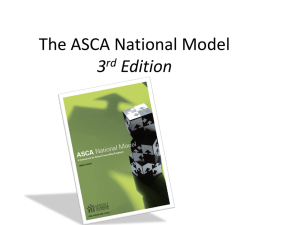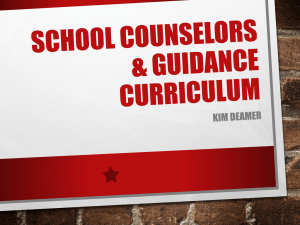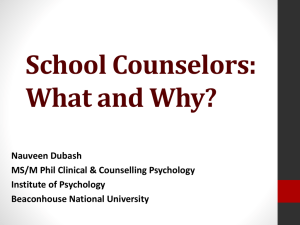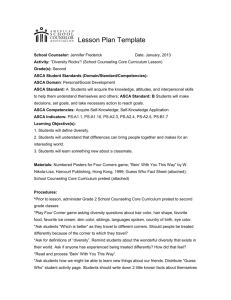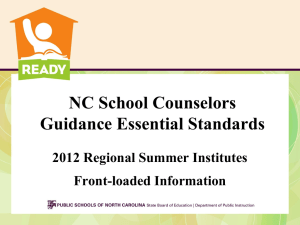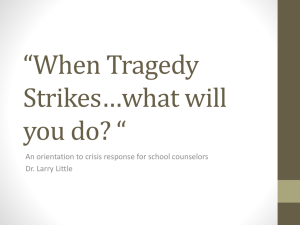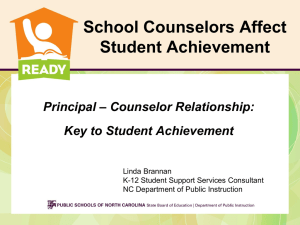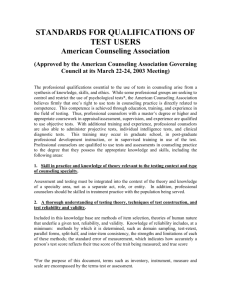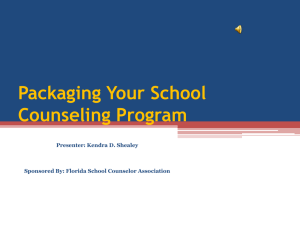605_intro_unit_1
advertisement
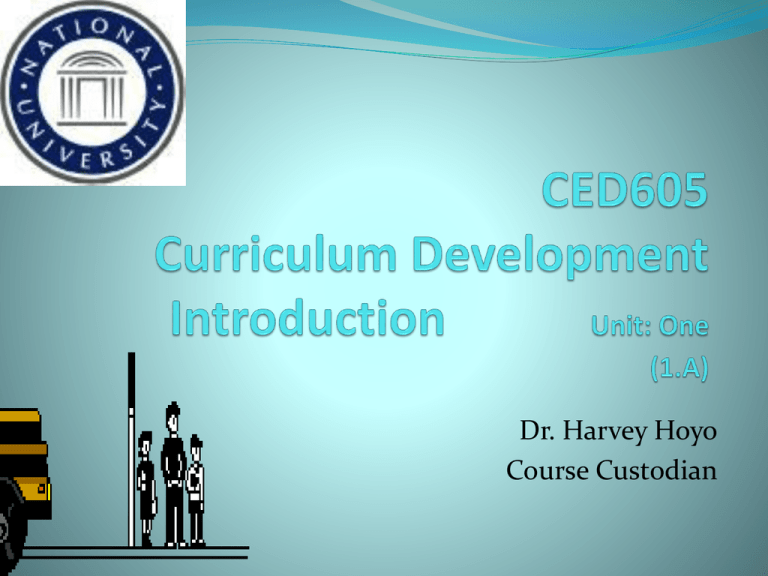
Dr. Harvey Hoyo Course Custodian Knowledge Base Adaptation Goals of Presentation A. Current Trends B. Ed Trust & ASCA National Model C. Tiered Support Programs D. Accountability Impact on School Counselors A Quick Write KWL: What do you know about delivering guidance lessons? What do you want to learn about delivering guidance lessons? What did you Learn about delivering guidance lessons? Current Trends in Education Standards-based education reform (clear standards, rigorous curriculum, supports, accountability). Focus on idea that all students can learn. Focus on “we take students from where they are and move them forward.” Focus on the achievement gap (systemic not traditional mental health model). Data driven decision-making. Current Change Models For School Counselors Education Trust Transforming School Counseling Initiative. American School Counseling Association National Standards and Model for School Counseling Programs. State Initiatives (e.g. Texas, California). Results-based Guidance (Johnson & Johnson). Education Trust Model The Achievement Gap is the most significant educational problem of our day. Much of the Achievement Gap results from factors that are under the control of schools. School Counselors must focus on achievement issues through both individual and systemic work. Education Trust Model Poor and Minority Students are Much Less Likely to Have: Exposure to a challenging college preparatory curriculum. Challenging classroom projects and homework assignments. Placement in 8th grade algebra, honors, and college placement courses. Access to effective academic support programs. Education Trust Model The Role of School Counselors needs to be redefined: Present Focus: Mental Health Focus New Vision: Academic Achievement Focus Individual student’s concerns and issues Clinical model focused on student deficits Whole school and system concerns/issues Developmental model building on student strengths. Education Trust Model Redefining The Role of School Counselors: Present Focus: New Vision: Guardians of the status Agents of change for equity and Involved primarily with Involved with students, Dependent on system’s Brokers for services for Postsecondary planners Champions for creating quo students resources with interested students social justice parents, educators, community students and parents. pathways for all students to achieve high aspirations How does the Education Trust impact your future as an effective school counselor? ASCA Model School Counseling Program “ASCA has developed a National Model for School Counseling Programs to connect school counseling with current educational reform movements that emphasize academic achievement.” ASCA Model School Counseling Program The model aligns the counseling program with the school’s academic mission. School Counselors: ●Are Leaders in Systemic Change ● Foster Equity and Access ●Promote Academic, Career and Personal/Social Development for ALL Students ASCA National Model Delivery System School Guidance Curriculum Individual Student Planning Responsive Services System Support Management System Agreements Advisory Council Use of Data Monitoring Student Progress Closing the Gap Action Plans Guidance Curriculum Closing the Gap Use of Time Accountability Result Reports Impact Over Time Pre-Post assessments for guidance lessons School Counselor Performance Evaluations Program/Curriculum Audits Academic Development From Moreno Valley Unified 1. Guidance Curriculum (HS) • ACADEMIC Career • • • Personal/ Social • • Developing Academic 4/6 year Plans Promotion/Retention Criteria Organization, Study and Testing Taking Skills Registration, College and High School Graduation Requirements Post High School Options Transition into the Real World ACADEMIC Career Personal/ Social Academic Results Goal Setting (K-5) After classroom guidance lessons pre-post tests indicated… • student knowledge of goal setting increased from 10% to 98% • 90% achieved their identified goal ACADEMIC Career Personal/ Social Academic Results Interventions (6-8) After Academic Counseling Groups: • 37% of 6th graders (64) • 24% of 7th graders (47) • 72% of 8th graders (46) Demonstrated GPA improvement ACADEMIC Academic Results Interventions (6-8) Career Personal/ Social Pre: Post: Students on retention list: Students who came off retention list: • 6th - 81 • 7th - 73 • 8th - 103 • 6th - 27 • 7th - 22 • 8th - 23 72 students avoided retention Academic Career PERSONAL/SOCIAL Personal/Social Results Conflict Resolution (K-5) • Number of students who could peacefully resolve a conflict increased from 55% to 88% • Following implementation of a Conflict Manager program the number of suspended students was reduced from 13% to 3% in the current year. Academic Career PERSONAL/SOCIAL Personal/Social Results Conflict Resolution (6-8) • At one site the number of students resolving conflicts with the help of peer mediators increased from 0 to 346 • At another site, the number who took advantage of peer mediation increased from 47 to 149 with a decrease in referrals by 10% Academic CAREER Personal/ Social Career Development Canyon Springs High School • In the last three years the number of students visiting the career center has increased from 30 to over 200 students per day with the satisfaction survey indicating 80% increase in relevancy. • Parent attendance at evening guidance events has increased from 150 to 500 parents with post evaluations as 97% favorable. • Scholarship dollars for students increased from $750,000 to $925, 000 • Finally, graduation rates have improved from 84 % to 89% What are simple; but effective ways you can measure the student success in your guidance lessons? Tier 3 5% Tier 2 20% Tier 1 100% 1. School improvement efforts/school climate 2. School-wide approach to discipline 3. Building student competencies with a Comprehensive Guidance Curriculum 4. Career Development Education: Navigation 101, ROP Career Labs, Career Academies Comprehensive Guidance Curriculum received by all students: Violence/Bullying Prevention Programs - Second Step/Steps to Respect Violence Prevention (Elem and MS versions) - Olweus Bullying Prevention Programs (K-8) - Bully Proofing Your School (best family components) - Bully Busters (teacher-based) (K-8) -PeaceBuilders (K-6) Academic Skill development - Caring School Community (K-6) -Student Success Skills (4-9) Social/Emotional Skill development - Social Decision Making/Social Problem Solving (2-8) - Resolving Conflicts Creatively Program (1-6) - Promoting Alternative Thinking Strategies (PATHS) (K-6) - I Can Problem Solve (ICPS) (PreK-5) Social skill development: Drug, alcohol, violence prevention - Life Skills Training (K-12) Lions-Quest Skills (K-12) Project Achieve (PreK-8, has been used in HS) Project Northland (6-8) Michigan Model for Comprehensive School Health Education (K-12) Career Planning (Sample Program) NAVIGATION 101: Career Planning http://www.k12.wa.us/navigation101/default.aspx - Focused on Goal Setting - Bimonthly, 45 minute meetings - Grades 6 thru 12 (Sequence ) - Nine recurring Themes - Twenty Advisory-based Lessons Per Year - 140 Downloadable Lesson Plans - Online Materials to Support Implementation - Evaluation Data Templates Data Demonstrates: students who participated in NAV 101: - More likely to have parents participate in student conferences - More likely to stay in school and move from 9th to 10th grade without dropping out - Greater success passing important “gatekeeper” courses (e.g., Algebra, Physics, and Chemistry) - Had higher 10th grade state achievement test scores (Math, Reading, and Writing) - Had higher high school graduation rates - Less likely to need remedial courses in their college programs Guidance Lessons Components What How Comprehensive Developmental Program Phase (Gybers & Myrick) School Guidance programs ensure that all students have access to support for academic, career, and personal/social development. School Counselors use Individual Planning, Responsive Services, Guidance Curriculum and System Support. School Counselors are accountable for time spent on different activities. How will the accountability movement impact your role while presenting guidance lessons? Additional Resources ASCA National Model (Bowers & Dahir, 2002) http://www.schoolcounselor.org/content.cfm?L1=10 Education Trust Education Watch, The Education Trust Community Data Guide http://www.edtrust.org/main/main/index.asp American Student Achievement Institute http://www.asainstitute.org/schoolcounseling/resou rces.html We need to be the change we want to see happen. We are the leaders we have been waiting for. -Gandhi What did you learn about guidance lessons impacting your role as a school counselor?

